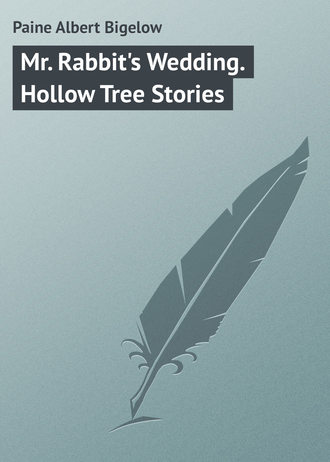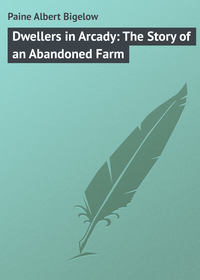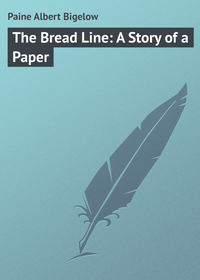 полная версия
полная версияMr. Rabbit's Wedding. Hollow Tree Stories

Paine Albert Bigelow
Mr. Rabbit's Wedding Hollow Tree Stories
LITTLE JACK RABBIT AND BUNTY BUN
JACK RABBIT TELLS ABOUT HIS SCHOOL-DAYS, AND WHY HE HAS ALWAYS THOUGHT IT BEST TO LIVE ALONETHE Little Lady has been poring over a first reader, because she has started to school now, and there are lessons almost every evening. Then by and by she closes the book and comes over to where the Story Teller is looking into the big open fire.
The Little Lady looks into the fire, too, and thinks. Then pretty soon she climbs into the Story Teller's lap and leans back, and looks into the fire and thinks some more.
"Did the Hollow Tree people ever go to school?" she says. "I s'pose they did, though, or they wouldn't know how to read and write, and send invitations and things."
The Story Teller knocks the ashes out of his pipe and lays it on the little stand beside him.
"Why, yes indeed, they went to school," he says. "Didn't I ever tell you about that?"
"You couldn't have," says the Little Lady, "because I never thought about its happening, myself, until just now."
"Well, then," says the Story Teller, "I'll tell you something that Mr. Jack Rabbit told about, one night in the Hollow Tree, when he had been having supper with the 'Coon and 'Possum and the Old Black Crow, and they were all sitting before the fire, just as we are sitting now. It isn't really much about school, but it shows that Jack Rabbit went to one, and explains something else, too."
Mr. Crow had cooked all his best things that evening, and everything had tasted even better than usual. Mr. 'Possum said he didn't really feel as if he could move from his chair when supper was over, but that he wanted to do the right thing, and would watch the fire and poke it while the others were clearing the table, so that it would be nice and bright for them when they were ready to enjoy it. So then the Crow and the 'Coon and Jack Rabbit flew about and did up the work, while Mr. 'Possum put on a fresh stick, then lit his pipe, and leaned back and stretched out his feet, and said it surely was nice to have a fine, cozy home like theirs, and that he was always happy when he was doing things for people who appreciated it, like those present.
Mr. Rabbit said he certainly did appreciate being invited to the Hollow Tree, living, as he did, alone, an old bachelor, with nobody to share his home; and then pretty soon the work was all done up, and Jack Rabbit and the others drew up their chairs, too, and lit their pipes, and for a while nobody said anything, but just smoked and felt happy.
Mr. 'Possum was first to say something. He leaned over and knocked the ashes out of his pipe, then leaned back and crossed his feet, and said he'd been thinking about Mr. Rabbit's lonely life, and wondering why it was that, with his fondness for society and such a good home, he had stayed a bachelor so long. Then the Crow and the 'Coon said so, too, and asked Jack Rabbit why it was.
Mr. Rabbit said it was quite a sad story, and perhaps not very interesting, as it had all happened so long ago, when he was quite small.
"My folks lived then in the Heavy Thickets, over beyond the Wide Grasslands," he said; "it was a very nice place, with a good school, kept by a stiff-kneed rabbit named Whack – J. Hickory Whack – which seemed to fit him. I was the only child in our family that year, and I suppose I was spoiled. I remember my folks let me run and play a good deal, instead of making me study my lessons, so that Hickory Whack did not like me much, though he was afraid to be as severe as he was with most of the others, my folks being quite well off and I an only child. Of course, the other scholars didn't like that, and I don't blame them now, though I didn't care then whether they liked it or not. I didn't care for anything, except to go capering about the woods, gathering flowers and trying to make up poetry, when I should have been doing my examples. I didn't like school or J. Hickory Whack, and every morning I hated to start, until, one day, a new family moved into our neighborhood. They were named Bun, and one of them was a little girl named Bunty – Bunty Bun."
When Mr. Rabbit got that far in his story he stopped a minute and sighed, and filled his pipe again, and took out his handkerchief, and said he guessed a little speck of ashes had got into his eye. Then he said:
"The Buns lived close to us, and the children went the same way to school as I did. Bunty was little and fat, and was generally behind, and I stayed behind with her, after the first morning. She seemed a very well-behaved little Miss Rabbit, and was quite plump, as I say, and used to have plump little books, which I used to carry for her and think how nice it would be if I could always go on carrying them and helping Bunty Bun over the mud-holes and ditches."
Mr. Rabbit got another speck of ashes in his eye, and had to wipe it several times and blow his nose hard. Then he said:
"She wore a little red cape and a pretty linsey dress, and her ears were quite slim and silky, and used to stand straight up, except when she was sad over anything. Then they used to lop down quite flat; when I saw them that way it made me sad, too. But when she was pleased and happy, they set straight up and she seemed to laugh all over.
"I forgot all about not liking school. I used to watch until I saw the Bun children coming, and then run out and get behind, with Bunty, and take her books, and wish there was a good deal farther to go. When it got to be spring and flowers began to bloom, I would gather every one I saw for Bunty Bun, and once I made up a poem for her. I remember it still. It said:
"Oh, Bunty Bun,The spring's begun,The violet's are in bloom.Oh, Bunty Bun,I'll pick you one,All full of sweet perfume."The sun is bright,Our hearts are light,And we will skip and run.Prick up your ears,And dry your tears,Dear bunny, Bunty Bun."Mr. Rabbit said he didn't suppose it was the best poetry, but that it had meant so much to him then that he couldn't judge it now, and, anyway, it was no matter any more. The other children used to tease them a good deal, Mr. Rabbit said, but that he and Bunty had not minded it so very much, only, of course, he wouldn't have had them see his poem for anything. The trouble began when Bunty Bun decided to have a flower-garden.
"She used to see new flowers along the way to and from school that she wanted me to dig up for her so she could set them out in her garden. I liked to do it better than anything, too, only not going to school, because the ground was pretty soft and sticky, and it made my hands so dirty, and Hickory Whack was particular about the children having clean hands. I used to hide the flower plants under the corner of the school-house every morning, and hurry in and wash my hands before school took up, and the others used to watch me and giggle, for they knew what all that dirt came from. Our school was just one room, and there were rows of nails by the door to hang our things on, and there was a bench with the washbasin and the water-pail on it, the basin and the pail side by side. It was a misfortune for me that they were put so close together that way. But never mind – it is a long time ago.
"One morning in April when it was quite chilly Bunty Bun saw several pretty plants on the way to school that she wanted me to dig up for her, root and all, for her garden. I said it would be better to get them on the way home that night, but Bunty said some one might come along and take them and that she wouldn't lose those nice plants for anything. So I got down on my knees and dug and dug with my hands in the cold, sticky dirt, until I got the roots all up for her, and my hands were quite numb and a sight to look at. Then we hurried on to school, for it was getting late.
"When we got to the door I pushed the flower plants under the edge of the house, and we went in, Bunty ahead of me. School had just taken up, and all the scholars were in their seats except us. Bunty Bun went over to the girls' side to hang up her things, and I stuck my hat on a nail on our side, and stepped as quick as I could to the bench where the water was, to wash my hands.
"There was some water in the basin, and I was just about to dip my hands in when I looked over toward Bunty Bun and saw her little ears all lopped down flat, for the other little girl rabbits were giggling at her for coming in with me and being late. The boy rabbits were giggling at me, too, which I did not mind so much. But I forgot all about the basin, for a minute, looking at Bunty Bun's ears, and when I started to wash my hands I kept looking at Bunty, and in that way made an awful mistake; for just when the water was feeling so good to my poor chilled hands, and I was waving them about in it, all the time looking at Bunty's droopy ears, somebody suddenly called out, 'Oh, teacher, Jacky Rabbit's washing his hands in the water-pail! Jacky Rabbit's washing his hands in the water-pail, teacher!'
"And sure enough, I was! Looking at Bunty Bun and pitying her, I had made a miss-dip, and everybody was looking at me; and J. Hickory Whack said, in the most awful voice, 'Jack Rabbit, you come here, at once!'"
Mr. Rabbit said he could hardly get to Hickory Whack's desk, he was so weak in the knees, and when Mr. Whack had asked him what he had meant by such actions he had been almost too feeble to speak.
"I couldn't think of a word," he said, "for, of course, the only thing I could say was that I had been looking at Bunty Bun's little droopy ears, and that would have made everybody laugh, and been much worse. Then the teacher said he didn't see how he was going to keep himself from whipping me soundly, he felt so much that way, and he said it in such an awful tone that all the others were pretty scared, too, and quite still, all of them but just one – one scholar on the girls' side, who giggled right out loud – and I know you will hardly believe it when I tell you that it was Bunty Bun! I was sure I knew her laugh, but I couldn't believe it and, scared as I was, I turned to look, and there she sat, looking really amused, her slim little ears sticking straight up as they always did when she enjoyed anything."
Mr. Rabbit rose and walked across the room and back, and sat down again, quite excitedly.
"Think of it, after all I had done for her! I saw at once that there would be no pleasure in carrying her books and helping her over the mud-puddles in the way I had planned. And just then Hickory Whack grabbed a stick and reached for me. But he didn't reach quite far enough, for I was always rather spry, and I was half-way to the door with one spring, and out of it and on the way home, the next. Of course he couldn't catch me, with his stiff leg, and he didn't try. When I got home I told my folks that I didn't feel well, and needed a change of scene. So they said I could visit some relatives in the Big Deep Woods – an old aunt and uncle, and I set out on the trip within less than five minutes, for I was tired of the Thickets. My aunt and uncle were so glad to see me that I stayed with them, and when they died they left me their property. So I've always stayed over this way, and live in it still. Sometimes I go over to the Heavy Thickets, and once I saw Bunty Bun. She is married, and shows her age. She used to be fat and pretty and silly. Now she is just fat and silly, though I don't suppose she can help those things. Still, I had a narrow escape, and I've never thought of doing garden work since then for anybody but myself and my good friends, like those of the Hollow Tree."
COUSIN REDFIELD AND THE MOLASSES
COUSIN REDFIELD BEAR MISBEHAVES AND IS CURED OF HIS TASTE FOR MOLASSESTHE Little Lady has been to the circus during the afternoon and has come home full of it. There were ever so many things to see there, but nicest of all were some little bears – three of them – who rolled over one another in their cage and seemed to be having the best time in the world. She tells the Story Teller all about them after supper; then she says:
"Do you know any story about little bears? Did the Bear family in the Big Deep Woods ever come visiting to the Hollow Tree?"
The Story Teller thinks.
"Yes," he said; "or rather, Mr. Bear came once alone, but that is another story. I know one story, though, about a little bear, a story that Mr. Crow told one night when he had been over to spend the afternoon with Mr. Bear, they bring very good friends."
"Mr. Bear told me this afternoon," Mr. Crow said, "about something that happened in his uncle's family some years ago. His uncle's name was Brownwood – Brownwood Bear – and he had a little boy named Redfield, but they called him Reddie, for short. Uncle Brownwood lost his wife one night when she went over to get one of Mr. Man's pigs, and he and little Redfield used to live together in a nice cave over near the Wide Blue Water, not far from the place where Mr. Turtle lives now. Uncle Brownwood used to be gone a good deal to get food and whatever they needed, and Reddie would stay at home or sleep in the cave, or play outside and roll and tumble about in the sun and have a very good time. He had a number of playthings, too, and plenty of nice things to eat, and every morning, before Uncle Brownwood Bear started out, he would put out enough to last Cousin Redfield all day – some ripe berries, and apples, with doughnuts, and such things, and always some bread and butter and molasses to finish up on.
"Little Reddie Bear liked all these things very much, but best of all he liked the molasses. Not bread and molasses, but just molasses; and he used to beg Uncle Brownwood to give him a whole saucer of molasses to dip his bread in; but once when his father did that he didn't eat the bread at all, but just ate up the molasses, and was sick that night, though he said it wasn't the molasses that did it, but carrying in some wood and washing the dishes, which he had to do every evening.
"But Uncle Brownwood didn't give Cousin Redfield any more molasses in a saucer; he spread his bread for him every morning, and set the molasses-jug on a high shelf, out of reach, and Reddie used to stand and look at it, when his father was gone, and wander how long it would be before he would be tall enough to get it down and enjoy himself with the contents.
"One day when Cousin Redfield was looking at the jug he had an idea. Just outside of the cave his father had made a bear-ladder for Reddie to learn to climb on. A bear-ladder is a piece of a tree set up straight in the ground. It has short, broken-off limbs, and little bears like to run up and down on it, and big bears, too, for it gives them exercise and keeps them in practice for climbing real trees.
"When Reddie had the idea, he ran out and looked at his bear-ladder; then he ran back and looked at the jug. If only that bear-ladder was in the cave, he thought, he could walk right up it and get the jug and have the best time in the world. The bear-ladder would go in the cave, for it was a very high cave, and the ladder was not a very tall one.
"But the bear-ladder was fast to the ground, and at first Reddie couldn't budge it. He worked and pushed and tugged, but it would not move. Then he happened to think that perhaps if he climbed up to the top of it, and swung his weight back and forth as hard as he could, he might loosen it that way. So he ran up to the top limbs and caught hold tight, and rocked this way and that with all his might, and pretty soon he felt his bear-ladder begin to rock, too. Then he rocked a good deal harder, and all of a sudden down it went and little Cousin Redfield Bear flew over into a pile of stove-wood, and for ten minutes didn't know whether he was killed or not, he felt so poorly. Then he crawled over to a flat stone and sat down on it, and cried, and felt of himself to see if he was injured anywhere; and he did not feel at all like bothering with his bear-ladder any more, or eating molasses, either.
"But that was quite early in the day, and after Cousin Redfield had sat there awhile he didn't feel so discouraged. His pains nearly all went away, and he began to feel that if he had some molasses now it would cure him. So then he got up and went over to look at the ladder, and took hold of it, and found that it wasn't very heavy, as it was pine, and very dead and dry. He could drag it to the cave easy enough, but when he got it there he couldn't set it up straight. He was too short, and not strong enough, either.
"So little Cousin Redfield went back and sat down on his stone to think again and cry some more, because he found several new hurting places that were not quite cured yet. Then, he noticed the clothes-line, and thought he might do something with that. He could get that down easy enough, for it was not very high. Cousin Redfield had often hung out the clothes on it himself. So he untied the ends of the clothes-line and tied one end of it to the top of his bear-ladder, but didn't know what to do with the other end, until he happened to see the big hooks in the top of the cave where his father hung meat when they had a good supply.
"So then Reddie made a bunch of the other end of the rope and threw it at those hooks, and kept on throwing it until after a while it caught on one of them, and enough of it hung down for him to get hold of. Cousin Redfield, for a small bear, was really quite smart to think of all that.
"It wasn't easy, though, even now, to get the bear-ladder up straight. Reddie pulled, and tugged, and propped his feet against the side of the cave, and the table and benches, and got out of breath, and was panting and hot and his sore places hurt him awful, and he thought he'd have to give it up, but at last the end of the bear-ladder caught on the side of the cave where the jug was, and stayed there, and Cousin Redfield could let go of the rope, and get behind the ladder and push, and then, pretty soon, it was up straight, and he could get the molasses-jug as easy as anything.
"It was getting along in the afternoon now, and Reddie knew that Uncle Brownwood Bear was likely to come home before long. So he went right up and got the jug, and nearly dropped it getting down, it was so heavy. But he got down with it all right, and then pulled out the cob that was its stopper, and tipped the jug to pour some of the molasses out in his hand.
"But the jug was quite full, and, the molasses being very thick, would not run out very well. So he tipped the jug over farther, but could only get a little. Then he tipped it on its side, and then pretty soon it commenced to run better, and came out better, and made a nice noise, 'po-lollop, po-lollop, po-lollop,' and formed quite a thick pool right on the floor of the cave, and little Cousin Redfield Bear got down on his hands and knees and licked and lapped, and forgot everything but what a lovely time he was having, and didn't realize that he was getting it all over himself, until he started to get up, and then found it was all around him, and his knees were in it, and everything.
"Cousin Redfield didn't get entirely up. He was nearly up when his foot slipped and he went down flat on his back; when he tried it again he went down in another position, and kept on getting partly up and falling in different ways, until he was an awful sight, and there wasn't so much molasses on the floor any more, because it was nearly all on Cousin Redfield. Then that little bear – little Reddie Bear – suddenly remembered that his father would be coming home presently, and that something ought to be done about it. He was so full of molasses he could hardly move or see out of his eyes. If he could only wipe it off. He had seen his father take a wisp of hay or nice, soft grass to wipe up a little that was sometimes spilled on the table, so Reddie thought hay would be good for his trouble. He would roll in hay, and that would take off the molasses.
"There was a big pile of soft hay-grass in the back part of the cave that Uncle Brownwood used to stuff his mattress with, and Cousin Redfield made for it, and rolled and wallowed in it, thinking, at first, that he was getting off the molasses, but pretty soon finding he was only getting on hay, and really had it all over him so thick that he could not roll any more, and could only see through it a very little. When he managed to get up he had nearly all the hay on him, as well as the molasses.
"Cousin Redfield was really a little walking haystack; and scared at his condition, because he thought he would probably never be a bear any more. He was so scared that he wanted his father to come and do something for him, and started to meet him, as fast as he could, with all that load of hay and molasses. He was crying, too, but nobody could really tell it from the sound he made, which was something like 'Woo – ooo, woo – ooo,' and very mournful.
"Uncle Brownwood Bear was just rounding the big rock there at the turn when he came face to face with Cousin Redfield and his hay. Reddie thought his father would be angry when he saw him, but he wasn't – not at first. Cousin Redfield didn't realize how he looked from the outside, or the lonesomeness of the sound he was making. Uncle Brownwood took just one glance at him, and said 'Woof!' and broke in the direction of a tree, and of course you could hardly blame him, for he had never seen or heard anything like that before, and it came on him so sudden-like.
"Then poor little Reddie Bear bawled out as loud as he could, 'Pa! Pa! Oh, pa, come back! I's me, pa; come back!'
"And Uncle Brownwood stopped in his tracks and whirled around and said, in an awful voice, 'You, Redfield!' for he thought Reddie was playing a joke on him, and he was mad clear through.
"Cousin Redfield saw that he was mad by the way he started for him, and became scared, and tried to run away as well as he could; but, not being able to see well, ran right toward the Wide Blue Water, and before he noticed where he was going he stumbled off of a two-foot bank where it was deep, and was down in the water, and had gone under for the second time before his father could lean over and grab him and get him out.
"Poor little Cousin Redfield Bear! By that time most of the hay was washed off of him, but he had got a good deal of the Wide Blue Water inside of him, and was so nearly drowned he couldn't speak. And when his father laid him on the bank, and rolled him, the water and molasses came out, 'po-lollop, po-lollop, po-lollop,' and, feeble as he was, little Cousin Redfield realized that he probably would never care for molasses again.
"When he was empty and could sit up, Uncle Brownwood got a pail, and a dipper, and a brush-broom, and cleaned him on the outside, and then rubbed him dry with an old towel, and put him to bed, though not until after he had scrubbed up the cave so they could live in it.
"Uncle Brownwood Bear did not punish little Cousin Redfield," Mr. Crow said. "He thought Reddie had been punished enough. Besides, Reddie was sick for several days. But Uncle Brownwood put up the bear-ladder much stronger than before, and set the empty molasses-jug in the middle of the table, and kept it there a long time, and when Cousin Redfield tried even to look at it, it gave him such a sick turn that he nearly died."
MR. BEAR'S EARLY SPRING CALL
AN UNWELCOME VISITOR PAYS A VISIT TO THE HOLLOW TREEONCE upon a time when it had been a hard winter in the Big Deep Woods, and spring was late, and there was still very little in the way of fresh food to be had, Mr. 'Possum came in quite excited, one evening, and after bolting the down-stairs door put a heavy prop against it, though he called up first to see if Mr. 'Coon and Mr. Crow were both in.
"I'm in," Mr. 'Coon called back. "I hunted till I was tired and couldn't find a thing worth bringing home, except some winter parsnips that I dug out of Mr. Man's garden."
"I'm in," Mr. Crow called back. "I found a beefsteak that Mr. Man had hung out to freeze. I'll cook it with Mr. 'Coon's parsnips. Why, is anything the matter?"
Mr. 'Possum came puffing up the stairs to the big room, and sat down before the fire, and took off his shoes and warmed himself a little, and lit his pipe, and said:
"Well, there may be, if we don't keep that prop pretty firmly against the down-stairs door. I met Mr. Robin while I was out, and he tells me that a new Mr. Bear has moved over into the edge of the Big Deep Woods, into that vacant cave down there by the lower drift. His name is Savage – Aspetuck Savage – one of those Sinking Swamp Savages, and he's hungry and pretty fierce. They've had a harder winter in the Swamp than we have had up here, and when Aspetuck came out of his winter nap last week and couldn't find anything, he started up this way. Mr. Man has shut up all his pigs, and Mr. Robin thinks that Aspetuck is headed now for the Hollow Tree. Somebody told him, Mr. Robin said, that we manage to live well and generally come through the winter in pretty fair order, though I can tell by the way my clothes hang on me that I've lost several pounds since Mr. Man built that new wire-protected pen for his chickens."











